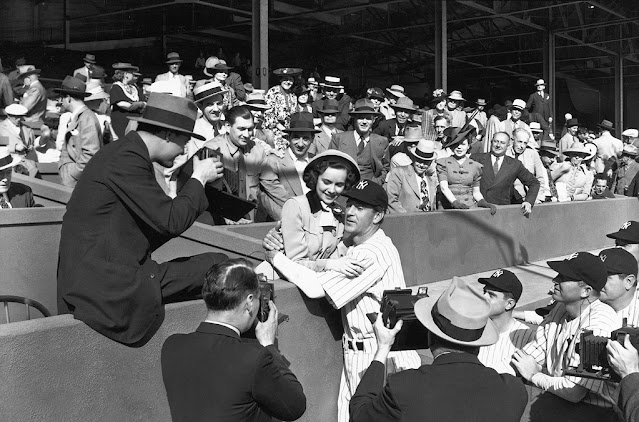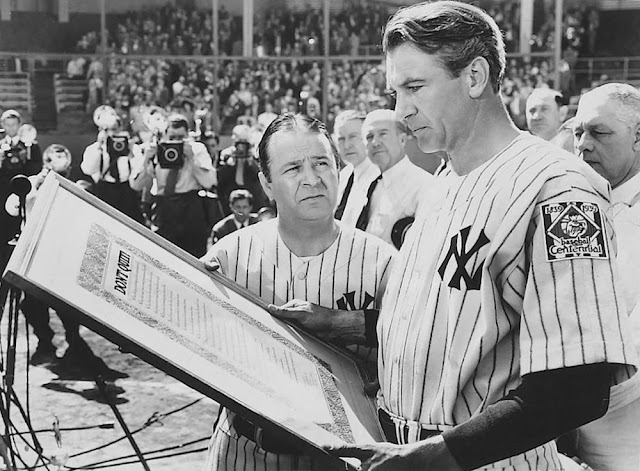Love them or not there is no denying the dynasty that is the New York Yankees and there is no fanbase as ravenous as theirs is. This dynasty goes all the way back to the beginning of Major League Baseball when there was just a handful of teams representing their sport to the whole world. As with any sport there are always a handful of legends of the game whose fame transcends their time on the team and are looked back with reverence and admiration. The Yankees have more than their fair share of those types of players: Babe Ruth, Yogi Berra, Mickey Mantle, and of course Lou Gehrig. Lou Gehrig stood out in the crowd as not only a great ball player but a genuine human being, too, who adored his fans and loved the game, playing in 2,130 consecutive games over the course of a fifteen year career. His life was tragically cut short by an illness that still has no cure to this day. The following year after his death, as tribute to one of New York’s favorite ballplayers, The Pride of the Yankees was released to celebrate the man, complete with appearances by many famous Yankees playing themselves as they, too, wished to tip their hats to the great Lou Gehrig.
The film opens with a young Lou Gehrig trying to buy his way into a ballgame amongst his piers, using baseball cards for payment. At first he is denied but when one of the players is called home mid-game, Lou is allowed to take his place. He immediately hits a home run, right through the window of a local shop. His mother has to give up all her meager savings to pay for the damages and insists he focus more on his schooling and become an engineer instead. He plays for the Columbia University baseball team while in college pursuing his mother’s dream, so intent on doing what she wants for him that when a baseball scout approaches him with an offer from the Yankees he refuses it. But fate steps in and his mother has some health setbacks that put her in the hospital. To pay for this special treatment he signs the contract to play in the minors for the Yankees.
It’s not long before he is promoted from the minors to play in the big leagues and can no longer hide this from his mother who is upset that he is no longer studying to be an engineer. She will eventually change her mind as his star begins to grow and he becomes famous alongside fellow teammate Babe Ruth who has also made a name for himself in the Bronx as a home run hitter. Meanwhile, Lou has fallen in love with a young woman, Eleanor Twitchell (Teresa Wright), the daughter of the local hotdog magnate, who nicknames him tanglefoot when he slips and falls on a line of baseball bats during a game. The two eventually get engaged and then married. After many wonderful years of marriage Lou begins to notice his body is beginning to betray him, stiffening up and losing strength in his hands. The medical diagnosis is grim as the young athlete must face that he has a terminal condition for which there is no cure.
There is a name for movies like this. It’s called “Ripped from the Headlines.” The death of Lou Gehrig would have still been fresh in the minds of America when this movie released. When the idea was first pitched to producer Samuel Goldwyn he passed on it as he didn’t watch baseball and had little interest in sports movies. His mindset was that women made the movie watching decisions in the household and didn’t like sports movies, making them box-office poison. His mind was changed, however, when shown a recording of Lou Gehrig’s famous “luckiest man” speech. Listening to Lou Gehrig speak about how he saw himself not as a man thrown a bad break but a man who was the luckiest in the world left Goldwyn in tears and he immediately agreed to produce the picture. To get around the curse of sports movies, The Pride of the Yankees would focus heavily on Lou Gehrig’s personal life, first with his parents and then later with Eleanor, his wife. The strategy worked as The Pride of the Yankees ended up in the top ten box-office successes of the year. Due to a distribution fee Goldwyn had arranged with RKO, the studio distributing the film, no matter how much money it earned it would still be a loss for them. This was solely for the prestige of having Goldwyn’s name tied to the studio which added box-office dollars to their other films to compensate for that loss; Hollywood finances at its finest.
Lou Gehrig, as played by Gary Cooper, is a gentle young man sensitive to those around him. In the forward to the movie it even spells this out with the declaration: “It is the story of a gentle young man who, in the full flower of his great fame, was a lesson in simplicity and modesty to the youth of America.” It continues on from there painting a portrait of a man so noble as to be compared to the soldiers currently fighting oversees in WWII, high praise indeed as the men who fought that war were held in very high esteem in 1942. It does paint a seemingly unrealistic expectation of the man that this film will try very hard to meet. Gary Cooper plays Gehrig as the type of loyal son who would put his own happiness aside to make his mother happy. Had she not suddenly gotten sick he might have never become the baseball legend he so wanted to be. Later, newly married, he gets put in an awkward position when he has to step in to defend his wife whose every decision about their new home is getting superseded by the wishes of his mother. We don’t get to see that intervention, just the aftermath which seems like a concession to avoid showing him in any type of negative light. This film wants to paint Lou Gehrig as being nearly perfect without a single personality flaw except perhaps an overeagerness to please everyone.
Gary Cooper is good here but Teresa Wright is even better, especially in the later scenes as Lou begins to struggle physically. Teresa had quite the year in 1942 garnering two Oscar nominations, winning for Mrs. Miniver. Her performance here is equally as good but not quite as flashy as the critically lauded Best Picture winner. She has to put on a brave face and pretend to be unaware of the terminal nature of her husband’s condition even though she could tell immediately from his expression as he leaves the doctor’s office what the diagnosis is. As Lou’s health declines she puts on a brave face but it subtly slips briefly whenever his back is to her. Her sorrow for the man she loves shines through as she tearfully watches him give his famous speech in Yankee Stadium.
The story of Lou Gehrig is a tragic one, one that was still stinging in the hearts of baseball fans when this released in 1942. The use of such real Yankees superstars like Babe Ruth, Bob Meusel, Mark Koenig and Bill Dickey as well as sportscaster Bill Stern would have added to the realism of the film at the time and serves as a fitting tribute by these men for their fallen comrade. Whether you’re a Yankees fan or even just a baseball fan in general it would be hard not to be moved by this story. It plays at the heartstrings and I doubt anyone could listen to Lou Gehrig’s final speech, watch his wife crying as she sees this great athlete struggling even to walk, and not be moved to tears themselves. Lou Gehrig was struck down in the prime of his life, just 37 years old, and was robbed a long and happy life with his devoted wife. She never remarried and devoted the rest of her life to honoring his legacy. She was involved in the making of this film, too, even though it couldn’t have been easy reliving these moments so fresh in her memories. She knew this story needed to be told and the audiences turned up to see it. It is not so much a baseball film as a film about a great man struck down too soon, in the prime of his life.
Academy Award Nominations:
Best Picture: Samuel Goldwyn
Best Actor: Gary Cooper
Best Actress: Teresa Wright
Best Screenplay: Herman J. Mankiewicz and Jo Swerling
Best Original Motion Picture Story: Paul Gallico
Best Scoring of a Dramatic or Comedy Picture: Leigh Harline
Best Sound Recording: Thomas T. Moulton
Best Art Direction - Interior Decoration, Black and White: Perry Ferguson and Howard Bristol
Best Cinematography, Black and White: Rudolph Maté
Best Film Editing: Daniel Mandell (won)
Best Special Effects: Jack Cosgrove, Ray Binger and Thomas T. Moulton
____________________________________________________
Release Date: July 14, 1942
Running Time: 128 Minutes
Not Rated
Starring: Gary Cooper, Teresa Wright, Babe Ruth and Walter Brennan
Directed By: Sam Wood









Comments
Post a Comment